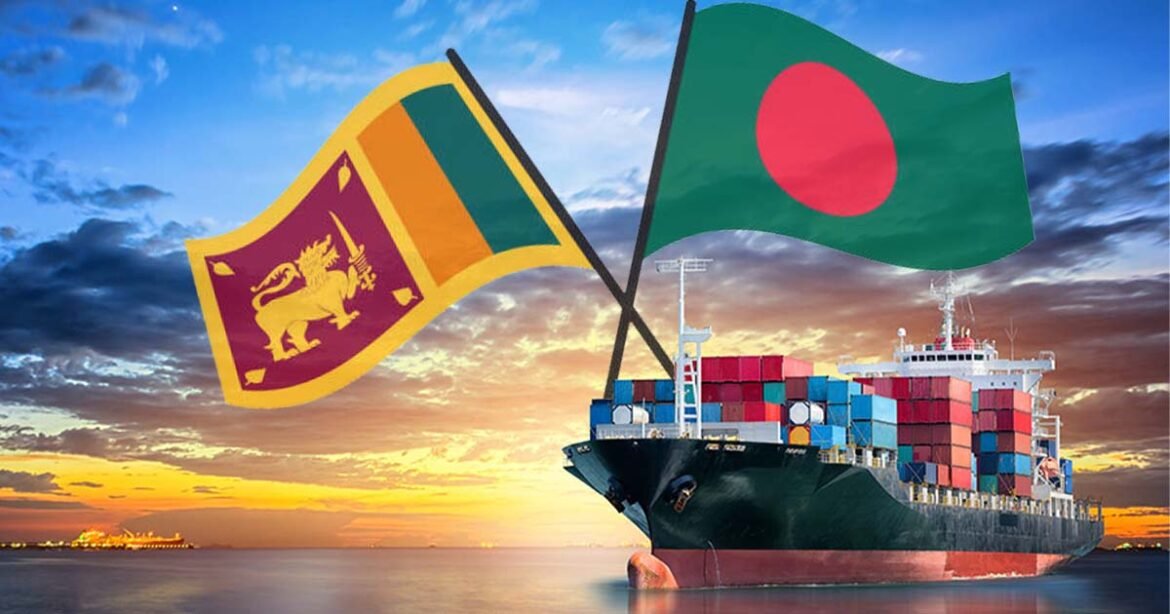Bangladesh and Sri Lanka, two friendly neighbouring countries in South Asia, have a long-standing relationship dating back to ancient times. As the global economy expands, both nations recognize the need to strengthen their trade ties to foster economic growth. To achieve this goal, discussions on a Preferential Trade Agreement (PTA) have been underway. However, several trade-related issues must be addressed for the successful implementation of such an agreement.
Prospects of a Bangladesh-Sri Lanka PTA:
Historical Economic Partnership and Growing Trade Relations
Bangladesh and Sri Lanka have a history of economic partnership, which has been strengthened through various agreements and initiatives. The establishment of the Sri Lanka-Bangladesh Chamber of Commerce and Industry (SLBCCI) in 2006 further enhanced bilateral trade, resulting in a significant increase in merchandise trade between the two nations. Exports from Sri Lanka to Bangladesh have seen a substantial rise, reaching $222 million in 2021, while Bangladeshi exports to Sri Lanka increased to $83 million in the same year. Despite these positive developments, bilateral trade volume remains relatively low compared to the total trade of both countries.
Potential for Market Expansion and Sectoral Cooperation
Bangladesh, with its large population and growing middle class, offers a vast market for Sri Lankan goods and services. Sri Lanka has already identified Bangladesh as its second-largest export market within the South Asian region. Moreover, both countries can leverage their respective strengths in the garment sector through cooperative efforts. Bangladesh, known as the second-largest producer of ready-made garments (RMG) products, can benefit from Sri Lanka’s expertise in textiles and value-addition processes. This sectoral cooperation can boost production efficiency and enhance competitiveness in the global market.
Boosting Tourism and Maritime Connectivity
Sri Lanka has a flourishing tourism industry, while Bangladesh possesses numerous historical and natural sites that attract tourists. By sharing knowledge and best practices, Sri Lanka can contribute to the growth of Bangladesh’s tourism sector, which can significantly contribute to its economy. Additionally, the PTA can strengthen maritime connectivity between the two countries. Currently, a substantial portion of Bangladesh’s ships passes through Sri Lankan ports. The utilization of maritime routes and the expansion of coastal shipping agreements can facilitate trade and manufacturing links, benefiting both nations.
Foreign Direct Investment (FDI) and Trade in Services
The signing of a PTA can create a conducive environment to attract foreign direct investment (FDI). Sri Lanka has already emerged as one of the top 15 sources of inward FDI stock in Bangladesh. With the liberalization of outward investment policies in Bangladesh, a PTA can further stimulate cross-country FDI flows. Additionally, trade in services, including banking, information technology, education, and power sectors, can be leveraged under the PTA, opening up new avenues for cooperation and economic growth.
Challenges in Signing a PTA Between Bangladesh and Sri Lanka:
Addressing Sensitive Lists and Trade Imbalance
One of the major challenges in signing a PTA between Bangladesh and Sri Lanka is the issue of sensitive lists, which consist of products subject to restrictions or higher tariffs. Both countries have extensive sensitive lists, hindering unrestricted bilateral trade. To overcome this challenge, collaborative efforts should be made to limit the number of sensitive products and define them more narrowly. Additionally, addressing the trade imbalance, which currently favours Sri Lanka, is crucial. Exploring new areas of cooperation, such as the blue economy and green energy, can help reduce the trade imbalance.
Relative Gains and Tariff Elimination
Another challenge lies in achieving a balance of relative gains from tariff elimination. Studies suggest that Sri Lanka stands to gain significantly more in exports to Bangladesh compared to the gains Bangladesh would receive from Sri Lanka. However, it is essential to note that any increase in bilateral trade is beneficial for the future, regardless of its size. The focus should be on fostering mutually beneficial trade relations rather than solely evaluating immediate gains.
The signing of a Preferential Trade Agreement (PTA) between Bangladesh and Sri Lanka holds immense potential for enhancing bilateral trade and investment. Despite the challenges surrounding sensitive lists, trade imbalance, and relative gains, both countries can benefit from the PTA’s implementation. By expanding market access, promoting sectoral cooperation, improving maritime connectivity, attracting foreign direct investment, and facilitating trade in services, Bangladesh and Sri Lanka can unlock the full potential of their trade relations. With proactive policies and effective leadership, the deepening of trade ties between these two South Asian nations can bring about substantial economic growth and mutual benefits for years to come.


